- Home
- Simon Winchester
Outposts Page 16
Outposts Read online
Page 16
It would be idle to pretend that the man who fetches up as tenant of the Residency, Ascension, is likely to be a figure on the cutting edge of British diplomacy. It was always one of the least favoured posts in the remit of the Colonial Office, and remains as unpopular today. The Administrator himself has very little to do. He looks after the police force, sets the weekly exchange rate for the St Helena pound, and issues instructions about road closures and sittings of the magistrate’s court. Meanwhile the civil administration of the island is now actually carried out by the BBC; the Royal Air Force and the various American agencies run the military side.
But assuming he is able to cast off his memories of ambition, the Ascension Administrator can savour a place of unusual loveliness. His house is more beautifully sited than any other in the remaining Empire: its gardens sweep down to cliffs from which most of the island can be seen, and the ocean stretches to the horizon on every side. At night the sky is ablaze with stars, and the island below pricked with the golden oases of light among the black volcanic shadows. There are wonderful vegetables and exotic fruits; and up here, on the high slopes, the weather is pleasant all the year round.
I walked up from the Residency one afternoon, through the groves of trees the sailors and the cable men had brought—eucalyptus, juniper, monkey-puzzle, acacia, Port Jackson willows. Then, as the road wound higher, so the hedges became as tall and as fragrant as any in Devon in summertime. The old farm, with its stables and milking halls and clock tower (where the naval rum was issued), came into view—a granite testament to the amazing energies of the Victorian sailors and marines. The very thought of building a Sussex farmhouse, with a clock, 2,000 feet up the side of a volcano in the middle of the equatorial Atlantic!
Up here was a world quite different from the harsh clinker desert below, where there was no grass, and just a wretched collection of beasts that included spitting wild cats, land crabs, goats and donkeys, and massive Brazilian turtles clambering wearily on to the blazing beaches to lay eggs. Up here there were palm groves and banana clumps, gardens with raspberries and ginger, and fields of grass and gorse. The trade winds, cool at this altitude, swept in across meadows where dairy cattle (administered by an official of the BBC in London, no less!) grazed contentedly. I climbed a stile, and headed on upwards into bamboo forest, where it was dark and cool, and the path was thick and slippery with clean brown mud. I took off my shoes and socks, and waded ever upwards, to the summit of Green Mountain.
At the top, in the tiny old crater, was the dew pond—made by the Navy to catch water, stocked by the Navy to be beautiful. There were blue lilies in flower the day I was there and large goldfish swam lazily through the dappled waters. The remains of an old anchor-chain lay beside the pond, and I had read somewhere that it was the custom to hold it, close your eyes, and wish…
At the far end of the pool, on the topmost point of the island, 2,817 feet above the sea, was a wooden box, with a visitors’ book inside, and I signed it: the last climber had been a wing commander, from Northumberland. Most, indeed, had been military men: two years before the entries were by young soldiers trying to keep themselves fit for war; now they were officers, curious, and with time on their hands. They had come striding up stick in hand, pipe clenched between teeth; in 1982 the men had come running and puffing, with a drill sergeant in hot pursuit, and no doubt they hated the summit, and cursed the slime and the knife-edges of the bamboo leaves, and the crazy accidents of creation that put such ghastly hills out here in the tranquil flatness of the sea.
But this afternoon no one else was in sight. I had Green Mountain all to myself. The only sound was the sighing of the trade winds through the bamboos, and the occasional quiet chatter of canaries down in the meadows. Truly, I found myself thinking, of all the forgotten corners of the Empire this was both the most lovely, and the most strange. Below me was all the machinery and technology of war, and the encrypted chatter of half the world’s spymasters. Down there—and I could glimpse the wastes of lava, and catch the glint of a radar dome—was that hell with the fire put out; up here, where the sailors of Admiral Fisher’s grand Imperial Navy had built a farm and a water supply, and had planted some trees, was something close to heaven. This, these few forgotten acres of hillside, showed to me what the Empire really could be when it tried—Rosebery’s great and secular force for good, which left memorials behind of which everyone could be proud, and for which everyone could be thankful.
6
St Helena
6
St Helena
It had been another blazing day on the limitless wastes of the South Atlantic Ocean. The rusty little freighter was three days out from Ascension Island, heading to the south-east. The sun, harsh and brassy and hot, glared down from a brilliant sky. The trade winds, always like the breath of a furnace, always from the south-east quadrant coming at us from over the port bow, wafted by at their customarily languid six knots. The sea looked like hammered silver, and we rolled almost imperceptibly on a long swell. Once in a while a bird appeared from nowhere and hovered and arched in the eddies round our masts and our rigging; once I saw a plastic bag and a beer bottle float past; and the night before a ship passed by on the starboard side, but no amount of calling her on the radio could win a friendly response.
‘This is the Royal Mail vessel Aragonite’ we would chant over the long-range radio, and the little VHF. But the ship never answered. We watched her slip past, her stern light winking and fading in the night haze, the faint throb of her motor a muffled beat across the sea. She was northbound, and she was probably Royal Navy: her radio silence suggested that, our radio operator said.
Once she was gone I stood at the taffrail gazing over the empty immensity of the sea. The night was starlit. This seemed just then such a lonely place. The Admiralty’s Ocean Passages for the World had a thin red line etched on the map, heading south-east from Ascension, and claiming to be the shipping route from New York to Cape Town. But it must have been a very minor route, or else it lay many miles to the side of us; we saw nothing, except the silent and nameless warrior-ship sliding by on our starboard flank. (The Farrel Line used to take Canadian flour to St Helena. But then the Government found another source a farthing a pound cheaper—and the Farrel Line lost the contract.)
But that was the night before. Now, with the sun going down on the third day, we were expecting a landfall. All the officers—only three, the Aragonite being such a tiny tub—were on the bridge, and the purser was on the forepeak, and such passengers as were well enough (there had been a depressing degree of mal de mer) were standing up on deck, straining their eyes for land. You could smell it, or you thought you could. The breeze came from almost ahead, and once in a while, especially if you were near enough the bow to escape the diesel-and-cooking-oil-and-tar smells of the ship, there was a momentary wafting of some familiar smell of land. Pine trees, perhaps, or seaweed, or grass. It might have been memory playing tricks; but noses become very sensitive at sea. I knew of a cat that, after three months on an ocean passage, would stand on the bows lashing her tail and sniffing in the direction of Madagascar, which was 200 miles away: she could smell that far. Now we could smell the island that lay ahead of us.
And then, with a whoop of triumph, a cry from the bridge. ‘There she is! That’s her! Right ahead.’
At first there was nothing, just the endless steel edge of the Atlantic horizon, pinkish in the early evening, touched by a small patch of settled cloud. But then, slowly, from within the cloud a vague darkness took form and shape—a grey, shadowy thing with straight, steep sides. It was the island: some of our passengers, standing mute, gazing at her gradually spreading bulk, were weeping. They were almost home.
The ship rolled closer and closer. Grey became brown, and patches of green mottled the upper slopes. The steep sides became sheer cliffs, rearing suddenly out of the empty sea. Seabirds came wheeling at us now in great clouds. As the sun slipped away so lights twinkled on the island ahead. I could see t
he crawling firefly of a car moving high up on the mountainside.
The master, a quiet Scotsman for whom this was a final voyage—he was about to retire to his house many thousands of miles away in Milngavie, and make a living in the bed-and-breakfast trade—rang down to the engine room. ‘Half ahead!’ The bells jangled. ‘Slow ahead!’ Then ‘Stop!’ The anchor chain rattled away in a cloud of iron dust. We came to a firm and definite halt, and a dozen small boats began lashing towards us, their occupants waving and cheering at our passengers, who waved and sobbed back. ‘Finished with engines’ the master telegraphed, with a tired smile. The Royal Mail Ship Aragonite, 682 tonnes, and of Glaswegian registry, had arrived at last at the loneliest major outpost of the British Empire. ‘This most solitary island,’ as the Edwardian writer E. L. Jackson began her classic book, ‘of St Helena.’
If we can agree that in the ragged spectrum of the current Empire the islands of Bermuda sit firmly at one end—important, prosperous, by and large contented and assured of a reasonably stable and secure future—then the colony of St Helena, sad to relate, lies foursquare at the other. This ‘pinpoint of inaccessibility, unbelievably remote’ was once a place of significance; it is now, to Britain, of no consequence whatsoever, is steadfastly ignored and neglected by a mother country to whom her natives look in vain for succour and friendship. It has been turned, in consequence, into what one recent visitor called ‘an Imperial slum’.
One cannot come away from St Helena without shaking one’s head and muttering that something must be done; but nothing has been, nothing is, and nothing ever will be done—under the suzerainty of Britain, at least. The story of St Helena is a tragedy of decay and isolation, poverty and ruin, and all played by a principal cast of proud and enchanting islanders, and in their home of magical beauty. (But a recent decision taken in London, taking the daily running of the island away from the Foreign Office, may yet improve matters.)
Jamestown, the capital, provides the first indication of the charm and loveliness of this forlorn little island. There is no harbour, and I was puttered to shore in a tiny dinghy, and had to step on to dry land by way of a slimy, sea-washed step. The legendary Atlantic rollers—long swells born in Newfoundland storms, six feet high in the inner bay, and booming ashore every half-minute or so—make any landing perilous in the extreme, and there are stout ropes hanging from a stanchion for nervous visitors to grab. I most certainly did; and so, on his visit there in 1984, did Prince Andrew. But his host, the Governor of the day, did not, and half of him vanished in the sea, spoiling his white duck trousers and splashing his Imperial jacket. The dunking, recorded for British television, remains about the only popular vision Britons have of their faraway possession. (The Governor left soon afterwards, and was offered a posting in a considerably drier segment of the former Empire, in Guyana.)
The quayside was jam-packed with islanders—‘Saints’ as they are known by outsiders, ‘Yamstocks’ as they call themselves, a nickname supposedly derived from the diet of yams on which the island slaves were once fed. Ships are infrequent callers at St Helena these days—the island was for many years on the Union Castle main line, and there would be a liner a fortnight—and any ship, even so small and undistinguished a vessel as a former North Sea dynamite carrier, brings out the crowds. People were jammed up against railings, perched on parapets, shinned up lamp standards, sitting on the old stone walls. There was a buzz of excitement in the air, and many of the eyes shone with tears. Every so often a cheer would go up when a relation or a friend would step on to shore—everyone would cheer, since everyone was a relation, and all were friends.
For all the shortcomings of their isolation in mid-ocean, the Saints are a home-loving people. They loathe the year-long contracts they have to work on Ascension 700 miles north or the four-year scholarships their students take up in Cheltenham, or Southampton. Few places can feel with such intensity the unalloyed pleasure, after years away, of just coming home.
‘Three weeks I been away,’ said one young man whom I met, and who told me he had been working for the Americans at their base on Ascension. ‘Not a long time, I know. But too long for me. I give it up. I miss my brother and my mother. I miss home too much.’ He had been a good companion on the boat, had taught me a new card game and had helped me rig a hammock on deck. Now he was back on his beloved island. He vanished into the thickets of friendly brown arms, and it was three days before I saw him, happily nose down in a pint of beer at the Consulate Hotel, surrounded by his workmates. He vowed he would never leave home again.
For him, as for many another islander, St Helena is a place ‘with only one entrance, and no exit’. And it feels like an entrance, what is more—you walk along the seafront for fifty yards, then turn inland, cross a narrow bridge over the dry castle moat and pass through a portcullis’d gate, and a wall a dozen feet thick. Inside, to the wonder of all who first enter this unique little ocean city, is the eighteenth century, preserved by happy accident, in every last detail.
‘Lifted bodily from Tunbridge Wells,’ wrote one visitor, on first seeing the square called Lower Parade. ‘A bright-looking tree in the centre…but still the capital of a second-class Imperial coaling station,’ said another, less kindly, at the turn of the century. ‘…the town resembles St Peter Port, the capital of Guernsey…’ according to Mrs E. L. Jackson a few years later.
Two rows of Regency houses, all bright paint and high dignity, iron trellis-work and sash windows, look at each other across the main street. In the square there is a castle—whitewashed stone walls with the coat of arms of the Honourable East India Company in red, white and silver, and all enclosing a little courtyard with shade trees and cobblestones and worn stone steps leading to the old offices of the present Governor. There are courts, and the library, and an exquisite public park with peepul trees brought from Hindoostan by John Company’s brigantines as they stopped at the island for fresh food, or by the warships back from the India station, and who called for water and coal.
There is a zig-zag path above the park—Governor Patten had it laid out for the pleasure of his two daughters at the beginning of the last century, and it is now called the Sisters’ Walk. It was probably the first view of the island seen by the island’s most famous resident, Napoleon, and leads to a not insignificant tale—as does so much in a town that, as the South African writer Lawrence Green suggested, ‘holds more of the strong meat of history than any other town in Britain’s colonial possessions’.
Napoleon had arrived on the evening of 17th October 1815, to begin his exile (an astonished St Helena had learned about the plan to keep the defeated Emperor on the island only a few days before, when he and his court of twenty-seven French men and women were but a few days’ sailing away). The Royal Navy—he had been brought from Plymouth aboard HMS Northumberland—decided to bring him ashore at night, to avoid the crowds. Sir George Cockburn, whose flag Northumberland flew on this most splendidly Imperial voyage, decided to put the Emperor up—for the first night, at least—in a pleasant Georgian house at the side of the park, and where the government botanist, a Mr Porteous, supplemented his meagre India Office wage by taking in lodgers.
But there was a coincidence, though whether Napoleon was told about it that night, and whether his sleep was thus disturbed, we do not know. It turned out that only a few months before Mr Porteous had rented the very room he now gave to Bonaparte to the man who met and savaged the Emperor at Waterloo—Arthur Wellesley, the First Duke of Wellington.
A few months after Napoleon had arrived—and was by now settled into a very grand mansion in the cool island interior—Wellington learned of the coincidence, and wrote to Admiral Malcolm, who then commanded the naval garrison on the rock of exile. And what is more, when Wellington wrote, he did so from Paris.
‘You may tell “Bony”,’ the Iron Duke scoffed, ‘that I find his apartments at the Elisée Bourbon very convenient, and that I hope he likes mine (in St Helena)…It is a droll sequel enough to the affairs of
Europe that we should change places of residence…’
It sometimes seems as if there is more history and a greater fund of anecdotes squeezed into the tiny city of Jamestown than in any other place on earth: it is, after all, a very tiny place indeed, with only 1,500 people jammed into a maze of lanes at the base of a narrow valley, its craggy walls given to collapsing with calamitous regularity.
The monuments tell of real local heroes, like Dr W. J. J. Arnold, whose obelisk stands in the very centre of the parade ground, and which is convenient to read as you step out into the sunshine from the old Consulate Hotel, and take a short walk after breakfast. ‘The best friend St Helena ever had,’ says the inscription.
He was an Irishman, colonial surgeon, and Acting-Governor for a few weeks before he died in 1925. He, unlike most of his peers, loved the islanders, and did all he could to help. He recognised their poverty and their need. And in turn the island poor worshipped him. He is said never to have charged those who couldn’t pay, and would buy medicines for those who couldn’t afford them. ‘He knew the heart of every poor person on St Helena,’ a boatman reminisced to a visitor in the Fifties. An old woman added that, in her view, ‘a shiver went through this place the day the doctor died’.
Dr Arnold is one of the few colonial figures the islanders remember with affection: as we shall see later, the British sent to run the colony, and those officials back in London who administered its fortunes, have never been liked or admired by the Saints themselves—except, it seems, Dr Arnold and a very few recent Governors, who seem game to stand up for the islanders’ cause, no matter how eccentric the notion seems back at head office.

 The Surgeon of Crowthorne
The Surgeon of Crowthorne Korea: A Walk Through the Land of Miracles
Korea: A Walk Through the Land of Miracles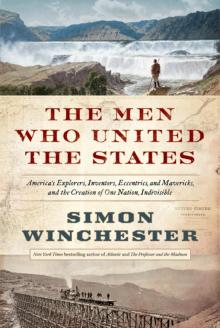 The Men Who United the States: America's Explorers
The Men Who United the States: America's Explorers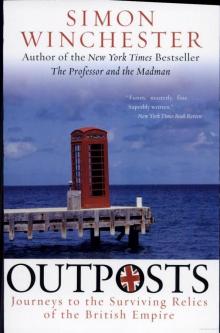 Outposts: Journeys to the Surviving Relics of the British Empire
Outposts: Journeys to the Surviving Relics of the British Empire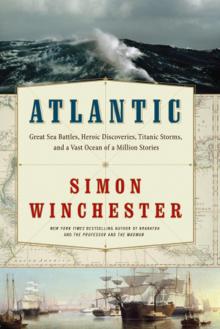 Atlantic: Great Sea Battles, Heroic Discoveries, Titanic Storms
Atlantic: Great Sea Battles, Heroic Discoveries, Titanic Storms The Professor and the Madman: A Tale of Murder, Insanity
The Professor and the Madman: A Tale of Murder, Insanity A Crack in the Edge of the World
A Crack in the Edge of the World The Perfectionists: How Precision Engineers Created the Modern World
The Perfectionists: How Precision Engineers Created the Modern World The Man Who Loved China: The Fantastic Story of the Eccentric Scientist
The Man Who Loved China: The Fantastic Story of the Eccentric Scientist The River at the Center of the World: A Journey Up the Yangtze
The River at the Center of the World: A Journey Up the Yangtze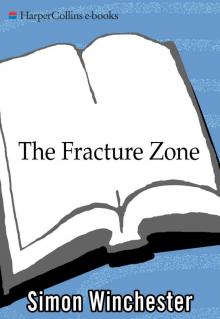 The Fracture Zone: My Return to the Balkans
The Fracture Zone: My Return to the Balkans The Map That Changed the World
The Map That Changed the World Krakatoa: The Day the World Exploded
Krakatoa: The Day the World Exploded The Man Who Loved China
The Man Who Loved China The River at the Centre of the World
The River at the Centre of the World Bomb, Book and Compass
Bomb, Book and Compass The Perfectionists
The Perfectionists The Meaning of Everything
The Meaning of Everything Exactly
Exactly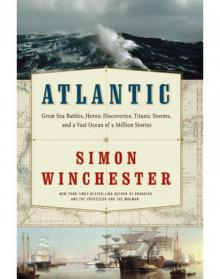 Atlantic
Atlantic Korea
Korea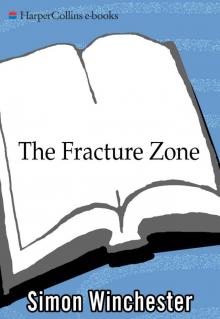 The Fracture Zone
The Fracture Zone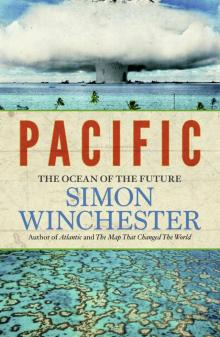 Pacific
Pacific Krakatoa
Krakatoa The Professor and the Madman
The Professor and the Madman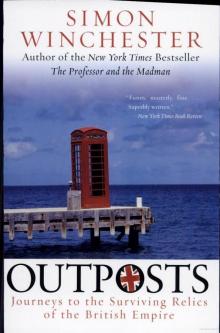 Outposts
Outposts